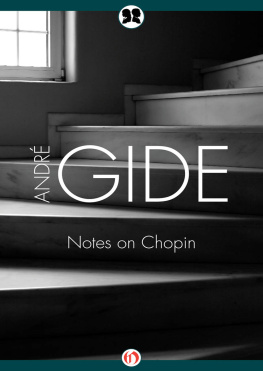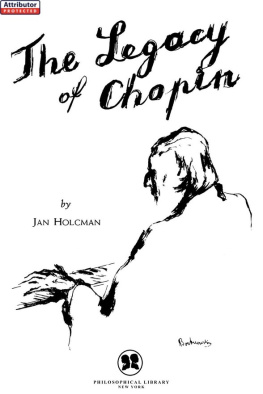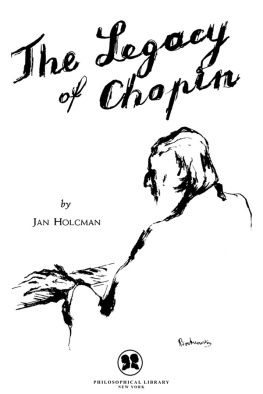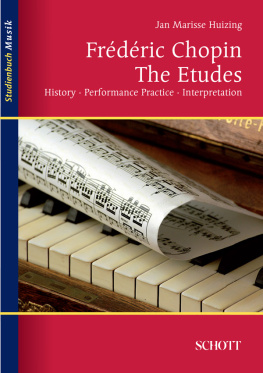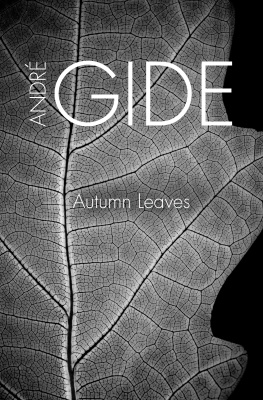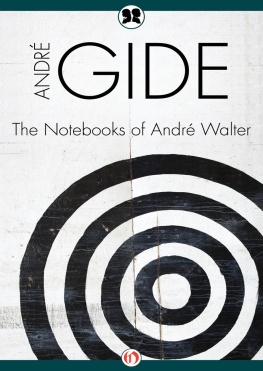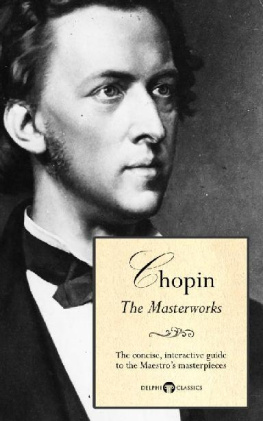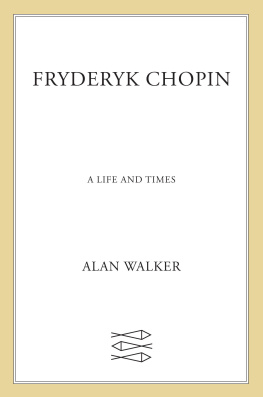Notes on Chopin
Andr Gide
Translated from French
by Bernard Frechtman
Philosophical Library

D E D I C A T I O N
I DEDICATE these pages to the memory of the Reverend Father, director of Monte Cassino, who, a few years before the war, received me in that famous monastery. Here is why:
Dom Adelberto Gresnitch, whom I had met in Rome, had very kindly invited me to go into retreat for a short time at Monte Cassino. We had several mutual friends, including Maurice Denis, who had just done his portrait. Dom Adelberto, who was of Dutch origin, spoke several languages equally well. A highly cultivated man, his conversation was captivating. I accepted his offer at once. The order of Saint Benoit is a hospitable order; that is, certain rooms and halls are set aside for travelers. But Dom Adelberto thought quite rightly that it would be more interesting for me to participate intimately in the monastic life. He therefore arranged for a cell to be put at my disposal and for me to take my meals, not with the tourists, but in the great refectory of the order. I expected to spend only three days at Monte Cassino; but these days were so instructive, the big cell had so fine a view and the society of the Benedictines was so charming, that I lingered with them for a whole unforgettable week.
I should, upon entering the monastery, have paid my respects to the Reverend Father, but he was ill and sent word to me that he could not receive me at once. It was not until the morning of my departure that he permitted me to express my gratitude to him. This formality appeared to me to be a painful duty which, I admit, made me quite apprehensive, and it was tremblingly that I entered an enormous hall where the Reverend Father awaited me and where Dom Adelberto, who ushered me in, left me.
The Reverend Father was extremely aged. Of German origin, he spoke Italian and French admirably; but what was I to say to him? He was in a big armchair, which his weakness prevented him from leaving. He bade me sit down near him. And his kindness was such that I quickly felt at ease. As soon as the first greetings were done with, we began to talk about music.
I know that you love it, he said, and that you have been performnig these last few evenings in the company of Dom Adelberto and some of our other people. I have much regretted not being able to be with you, for I too love music very much. I have been told that you have been able to put our mediocre piano to good use. I too played the piano. But for a long time I have had to give it up and content myself with reading without performing. Are you aware that reading music silently in this way and hearing it in imagination is a perfect joy? Yes, when I have to remain lying down, as often happens, it is not the Church Fathers or other books that I send for, but rather musical scores.
He paused for a few moments, anxious to see whether I was following him, then:
And what do you think I send for? No, its not Bach; its not even Mozart Its Chopin. And he added: That is the purest of music.
The purest of music. That is quite right, something I should have hardly dared say and am anxious to shelter with all the authority of so important and so aged a religious dignitary. Surprising words, but they will be understood by those for whom the music of Chopin is not (or at least is not merely) that profane and brilliant thing which performers present to us in concerts.
But the most surprising thing about those words is that they were uttered by a German; for, it seems to me, there is no music less Germanic. Had Barrs been a musician, what a Lorrainer he would have made of Chopin in the name of his early Nancy origins. Though I may recognize in Chopins work a Polish inspiration, a Polish spring, I am also pleased to recognize in this raw cloth a French cut, a French fashion. Am I going too far? Let us suppose that there is nothing particularly French in the composition of his poems, but that rather continuous association with the French spirit, with French culture, led him to exaggerate the qualities of the Slavic genius that were precisely the most anti-Germanic.
In like manner, the composer I wish to contrast with Wagner is not Bizet, as Nietzsche was fond of doing, and not without spite, but Chopin. And if objection is made that there is a ridiculous disproportion with the enormous mass of Wagner, and that in comparison with his gigantic work the work of Chopin seems incomparably slight, I shall answer that it is precisely in that respect that I first wish to contrast them and that it is because of its enormousness that Wagners work seems to me most Germanic. I feel this enormousness not only in the inhuman length of each work, but in excesses of all kinds, in the insistence, in the number of instruments, in the overworking of the voices, in the pathos. Before him, music had become particularly effusive, displaying emotions as amply and intensely as it could. Chopin, on the other hand, was the first to banish all oratorical development. His sole concern, it seems, is to narrow limits, to reduce the means of expression to what is indispensable. Far from charging his emotion with notes, in the manner of Wagner, for example, he charges each note with emotion, and I was about to say: with responsibility. And though there are doubtless greater musicians, there is none more perfect. With the result that the work of Chopin, hardly more voluminous in its kind than the poetic work of Baudelaire, is comparable to Les Fleurs du Mal in the intense concentration and significance of the best pieces that compose it, and through the extraordinary influence that both of them, for that very reason, were able to exert.
NOTES ON CHOPIN
I ANNOUNCED my Notes on Chopin as early as 1892, almost forty years ago. It is true that at the time I announced: Notes on Schumann and Chopin. Today the coupling of these names causes me a malaise comparable to that which Nietzsche said he experienced before Goethe and Schiller. At the time, it seemed to me that there was much to be said about Schumann too; but it has seemed to me less and less important.
Schumann is a poet. Chopin is an artist, which is quite different; I shall go into this later on.
But, by a strange destiny peculiar to him, the more the performers of Chopin try to spread a knowledge of his work, the more he is misunderstood, Bach, Scarlatti, Beethoven, Schumann, Liszt or Faur can be more or less well interpreted. One does not falsify their meaning by slightly distorting their character. Chopin is the only one who is betrayed, who can be deeply, intimately, totally violated.
Have you ever heard actors declaiming Baudelaire as if they were doing Casimir Delavigne? They play Chopin as if it were Liszt. They do not understand the difference. Thus presented, better Liszt. There the virtuoso finds at least something to take hold of, something to be taken with; through him. Liszt truly allows himself to be grasped. Chopin utterly escapes him, and so subtly that, indeed, the public does not suspect it.
We are told that when he was at the piano Chopin always looked as if he were improvising; that is, he seemed to be constantly seeking, inventing, discovering his thought little by little. This kind of charming hesitation, of surprise and delight, ceases to be possible if the work is presented to us, no longer in a state of successive formation, but as an already perfect, precise and objective whole. I see no other meaning in the titles that he was fond of giving to certain of his most exquisite pieces:

